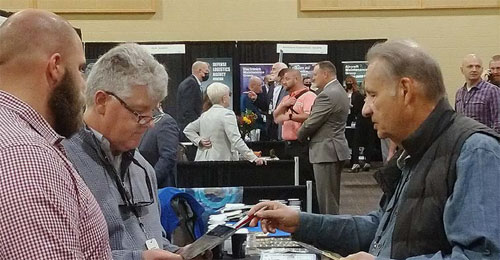By Brice Wallace
Matthew Schoonover came to the recent Procurement Technical Assistance Center Symposium in Layton with lots of information about federal government contracting.
However, the event’s keynote speaker admitted he had more questions than answers about the hottest topic in that realm: President Biden’s executive order requiring federal contractors and subcontractors to have their workers fully vaccinated against COVID-19 by Dec. 8.
Schoonover, founder and managing member of law firm Schoonover & Moriarty LLC, said the executive order requires face masks and social distancing guidelines be followed inside any covered contractor worksite — including applying to visitors — and that contractors must designate a person or people to oversee COVID-19 workplace safety efforts.
But the vaccine mandate is “obviously the most controversial part of the guidance,” Schoonover told the crowd at the Davis Conference Center.
“This is obviously a very big deal, and it’s one that I’ve been talking to my clients about, because there’s a lot of concerns about the ability to actually meet the vaccine part of the mandate. … The vaccine part tends to be the problem, because what do you do if you have people — employees — that don’t want to get the vaccine, that say, ‘I would rather lose my job than go get the vaccine?’”
Following Biden’s order being issued, the White House’s Safer Federal Workforce Task Force issued guidance explaining the vaccination requirements and other COVID-19-related safety measures for federal prime contractors and subcontractors pursuant to the order. The guidance requires “covered contractors” to ensure that “covered contractor employees” are fully vaccinated unless the employee qualifies for a medical or “sincerely held religious belief” exemption.
Schoonover said the order applies to workers involved directly in federal contracting but also those who support them, such as billing, human resources and legal personnel at that company. It also applies to remote workers and those who already have been diagnosed with COVID.
“For those that are truly vaccine-resistant, I’ve talked to several clients who say, ‘I know I’m going to lose this person, I’m going to lose that person. What do I do?’” Schoonover said, adding after a long pause: “Sure hope you didn’t come here for an answer to that question.”
Many businesses, he said, are “now facing the issue of, what happens?”
“This mandate really is, I think, one of the hot topics in federal government contractors, because they are all facing the same questions: What do I do with this person that is telling me they’re not getting vaccinated?”
Schoonover said he hopes that vaccine-resistant employees will get the shots because they will come to realize that they need to keep their job, or, should they leave it, will realize that any other federal government contractor will face that same vaccine mandate.
“That, I hope, is the calculus that’s involved here,” he said.
The order has the potential to affect tens of thousands of Utahns. A recent report from the Kem C. Gardner Policy Institute indicates that Utah’s defense industry supports 211,000 jobs and contributes over $19 billion in economic activity, a figure that has doubled since 2015. The largest military installation in Utah, Hill Air Force Base, was the state’s sixth-largest employer in 2019, employing 4,521 active-duty military personnel, 1,137 Air Force reservists and 14,174 federal civilians.
Further complicating the vaccination-requirement situation is that the executive order and the guidance do not specify exact penalties if a contracting company does not comply. No fines are listed in the guidance, nor does it contain language saying the government contract would be terminated.
Schoonover suggested that contractors obtain vaccination records from their employees. For employees against a vaccination, the company should provide written exemptions for them and determine what accommodation they need.
The burden of deciding who qualifies for a medical exemption or religious exemption falls on the employer, he said. “I am an employer, too,” he said. “I do not want to be in the position of looking at my employee and saying, ‘I don’t think your religious belief is sincere enough.’”
“It’s a difficult issue for small businesses,” he said of the order. “It’s certainly the one we’re seeing more and more questions about, particularly as Dec. 8 moves closer. I wish I had more answers about the effect of the guidance and its impact on small businesses.”
Another part of the symposium featured a video linkup with U.S. Rep. Blake Moore from Washington, D.C. He noted that Utah has an “incredibly strong” defense community but said PTAC can help companies wanting to get into government contracting “navigate a very peculiar world” that is “a maze of mirrors” that makes “no sense whatsoever.”
Still, the public/private partnerships forged through government contracting result in a stronger nation, he said.
“Government does not do things well,” Moore said. “We need the private sector to provide the innovation and the push — technology-wise, process-wise, you name it.”
PTAC is part of the Governor’s Office of Economic Opportunity. Chuck Spence, PTAC’s director, said that even with the COVID pandemic, PTAC worked with suppliers that were awarded more than $1.5 billion in government contracts during the past year, including $87 million to companies in rural Utah. PTAC also participated in 76 outreach sessions, including events, trainings, conferences and similar activities.








